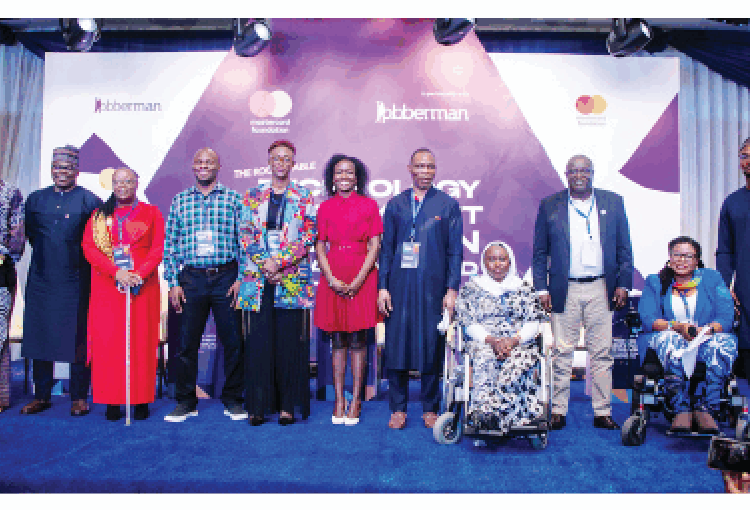Jobberman Nigeria and the Mastercard Foundation have ramped up calls on the Private sector in Nigeria to increase job quotas for Persons With Disabilities (PWDs) in the sector aimed at bringing out the best in them thereby contributing to national development.
Indications to this development emerged during a recent roundtable on Technology and Employment Inclusion in Marginalised Contexts convened by Jobberman Nigeria in partnership with the Mastercard Foundation under the Young Nigeria Works programme in Abuja.
The roundtable brought together stakeholders from government, the private sector, civil society, digital platforms, and development organisations to explore ways to address systemic barriers and unlock opportunities within the digital employment ecosystem for Nigeria’s most vulnerable groups—particularly women in underserved communities, PWDs, and internally displaced persons (IDPs).
During the roundtable, Jobberman, primarily known as a West African job board, tried to bring its international reach in Nigeria by offering resources for job seekers seeking global opportunities, especially the PWDs.
In her remarks Hilda Kabushenga, CEO of The African Talent Company (parent company of Jobberman), urged the government to give more incentive to the private sector employers to adopt disability inclusion policies, such as income tax exemptions and investment-related tax rebates.
“Technology must be a tool for inclusion, not division. As the world of work continues to evolve, we must ensure no one is left behind,” she said.
Rosy Fynn, Country director of Mastercard Foundation Nigeria, in her remarks emphasised the Foundation’s commitment to inclusive economic growth, saying “this roundtable aligns with our goal of enabling 30 million young Africans, especially young women to access dignified and fulfilling work by 2030.
“Inclusion is not a side conversation. It is the main agenda. We must create systems where marginalised groups are not just considered but prioritised,” Fynn said.
Senior Special Assistant to President Bola Tinubu on Special Needs and Equal Opportunities, Mohammed Abba Isa, in his keynote address, said it has become incumbent on stakeholders to push for at least 5% job quota for PWDs, even as he called for an amendment to the National Disability Act for that purpose in private institutions.
Isa lamented that the PWDs have been excluded from employment opportunities, while displaced persons, despite their resilience, often lack access to digital tools and resources. He added that digital ecosystem that offers equitable access to opportunities will bring justice for all.
Isa said, “As the senior special assistant to the President on Special Needs and Equal Opportunities, I have consistently advocated for the full implementation of the minimum 5% employment quota for PWDs in public institutions.
“However, we must go a step further. I call for an urgent amendment to the National Disability Act to extend this quota to the private sector. No qualified person with a disability should be excluded from contributing meaningfully to our economy.”
A key highlight of the event was the presentation and validation of a new research report titled: “Technology and Employment Inclusion in Marginalised Contexts”. The report explores how digital platforms such as job boards, gig and remote work platforms, and social media can unlock access to meaningful employment for marginalised populations.
It also outlines the structural, cultural, and technological barriers these groups face, including low digital literacy, unaffordable data costs, and discrimination in the labour market.
The Technology and Employment Inclusion in Marginalised Contexts research highlights stark inequalities in employment access for marginalised groups in Nigeria. Nearly 9 in 10 employers don’t recruit from these groups, with 72% making no effort toward inclusive hiring.
The reports also exposed skills gaps, transport issues, and bias, which remain major barriers, yet 55 per cent of PWDs and 44 per cent of displaced women have found work, often through self-employment in creative/media and agricultural sectors.
Poor educational access, as 85 per cent of schools unequipped for PWDs, compounds the problem, though digital tools and remote work are creating new pathways. The report revealed that employers now cite a need for subsidised inclusivity training and public recognition to drive change.
Breakout sessions were held focusing on three critical groups: women in disadvantaged communities, persons with disabilities, and internally displaced persons. Each session provided space for honest dialogue and collaborative problem-solving, generating insights to inform policy and practice.
Jobberman is a leading recruitment and career development platform in West Africa, particularly known in Nigeria. It serves as a bridge between job seekers and employers, offering services like job postings, online career advice, training, and personalized HR solutions.





